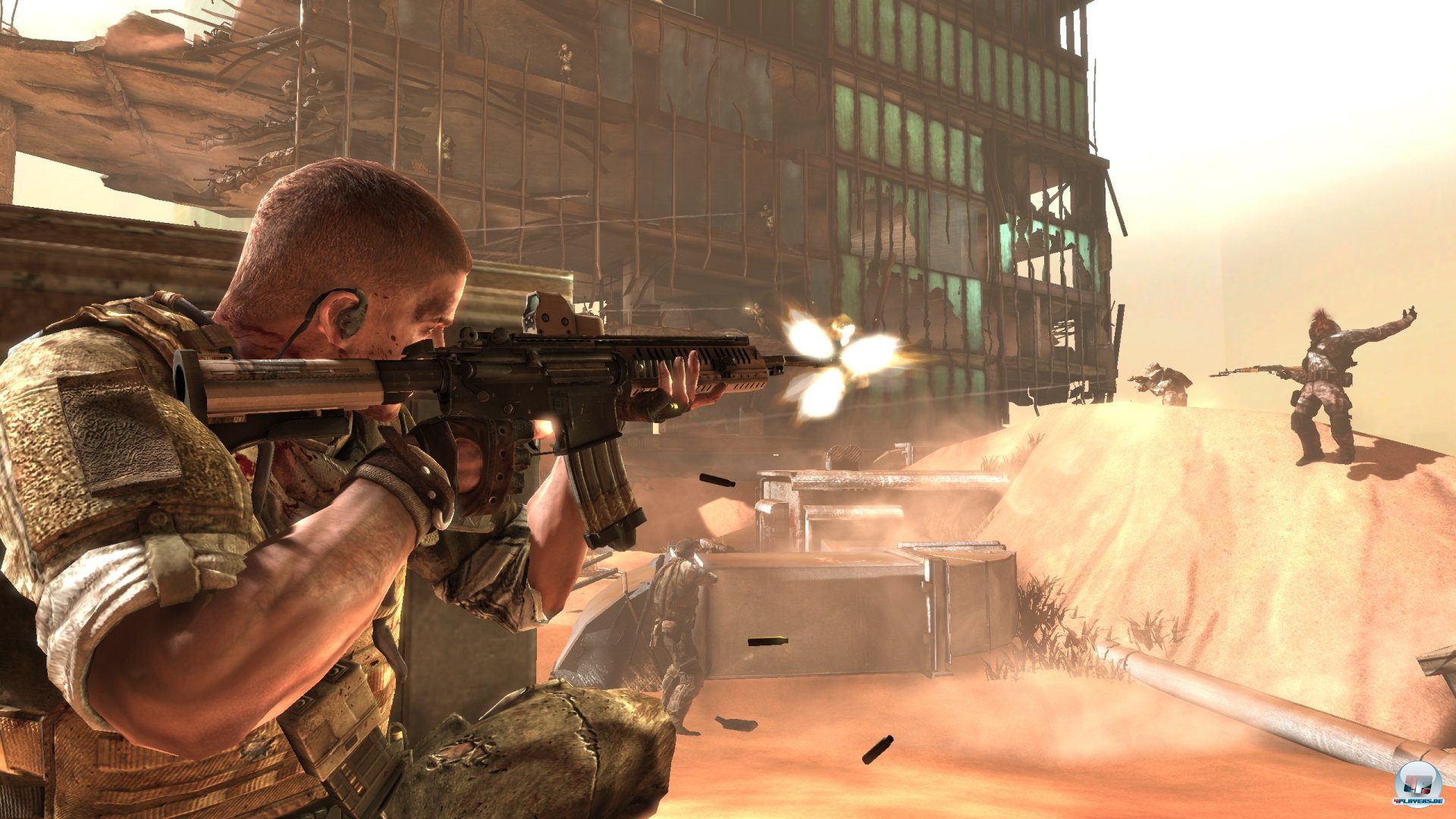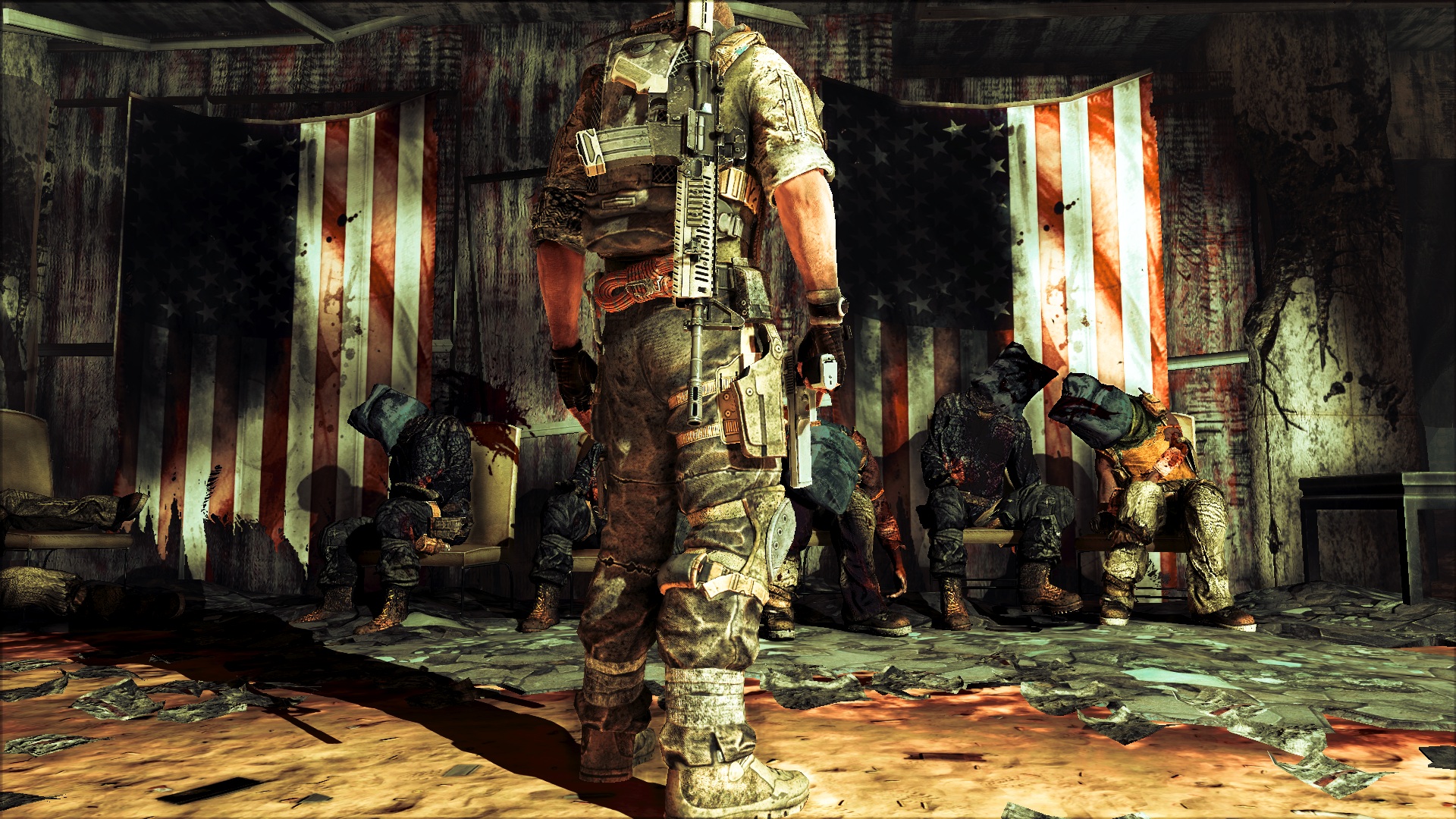So I picked up "Spec Ops: The Line" the other day, after much fuzz was made on portals like the Escapist about how this game really challenges conventiones of the genre and takes shooters to a whole new level. OK, I though, let's try for yourself. So I started playing, entirely un-impressed at first. A generic cover-based shooter. Gears of War in the Middle East. I'm an American elite soldier shooting guys with turbans, frentically shouting in Arabic. After a while, though, something starts to feel wrong, and you can't really put the finger on it. And then, suddenly, the infamous chapter eight happens, and you're all over the place. The impact is comparable only to Modern Warfare 2's "No Russian", but it is much more meaningful and thoughprovoking and not all going just for the cheap scandal of it. But let's not get ahead of ourselves. I give you a fair warning now: if you plan on playing "Spec Ops: The Line", stop reading now and return later, because there will be spoilers, and you don't want to be spoiled. If you read on, consider stopping at any paragraph and playing it for yourself. You really don't want to be spoiled. If you don' intend on playing it, say, because you never play video games, please read on. This is just too fascinating to pass over simply because you don't play.
 |
| US flag code: Never fly the glag upside down, except cases of dire emergency. |
So, let's take on the somewhat silly backstory: Dubai, a city in the United Arab Emirates, has been hit by apocalyptic sandstormes and is still ravaged by them. Colonel Konrad and his 33rd bataillon volunteered, coming back from Afghanistan, to check out what happened and to lend a hand. No one has heard of them since. A team of three Delta soldiers is sent in to investigate, led by Captain Walker (the player character). With him is the sniper Seargeant Lugo and the heavy weapons expert Lieutenant Adams. The three are as generic as one can get, Adams being black, Lugo wisecracking and Walker voiced by Adam North, who has voiced so many badass player characters like Uncharted's Nathan Drake that hearing his voice is like seeing a distant cousin. Since the sandstorms of Dubai prevent communication, the goal of Delta is to make contact, if there is any to be found, and to report back for an evacuation.
 |
| May I present the protagonists: Adams (left), Lugo (back), Walker (front) |
It goes on rather generic, as I mentioned. Trashtalking a bit, the characters move on and find themselves at gunpoint with some locals. Lugo, speaking Farsi, tries to translate, but soon a shooting ensues - the first of many to come. Finding evidence of dead soldiers, Walker decides to find out more, and the squad heads into Dubai. Several shootouts later, we find an American working together with the insurgents, and he has captured a soldier of the 33rd. It is strange, and the characters can't really make something out of it, but clearly, this has to be investigated. Unfortunately, on rescuing the soldier, the American traitor dies. We have to suspect that there has been a rebellion in the 33rd. Let's investigate! It's not long before we find ourselves blowing the whole insurgency to pieces. Over an omni-present radio, someone gleefully informs everyone that the truce was broken. There's war now. What truce? Who is the Radioman? Questions are piling up. (You may consider stop reading again. Play the game.)
 |
| Likewise piling up: dead bodies |
Then, suddenly, in the bowels of a Dubai skyscraper, we find ourselves gun to gun with members of the 33rd, and fighting ensues. The characters are obviously mistaken for CIA (since we're shooting Americans now, we can understand them), which seems to have some beef with the 33rd. Unfortunately, it's impossible to clear the misunderstanding, so shooting Arabs makes place to shooting US soldiers. It's a jarring effect. We understand what they are talking about, the commands they shout, and their pain becomes so much more relatable. But on it goes. It really seems like a part of the 33rd rebels against the other. We blunder into a mass round-up: soldiers of the 33rd ushering civilians on. We interfere and try to rescue them, but after shooting most Americans, they still manage to take 40 to 50 with them. The remaining civilians shout at us and want us gone. This is becoming stranger and stranger.
 |
| They understand as little as the player does. |
At this point of playing, I voiced my suspicions to my wife: in this game, you have no clue what exactly you are fighting, and why, but unlike other video games (in which essentially the same happens) this game seems to bring this to its logical conclusion. I didn't imagine at that point just how right I would turn out to be. The game will indeed go very farther than this. But I'm getting ahead of myself, again. Walker suspects the Radioman to be behind this, because Konrad is a noble man. By the way, although the reference escaped me, it's easy to figure out: Colonel John Konrad is a mix of Joseph Conrad, the author of "Heart of Darkness", and Colonel Kurtz, the antagonist of the book. You may know it from its movie adaption, "Apocalypse Now". In an early stage of game development, they wanted to recreate this story. But they went farther than that, believe me. Anyway, we march on, shooting our way through the 33rd and try to rescue a CIA agent that is held captive. On the way, we find proof for atrocities that the 33rd committed: executed prisoners, mostly. There undoubtely was a rebellion.
 |
| Nothing says "freedom" so much as an Abu Ghraib reference. |
When we finally meet with a living CIA agent (although mortally wounded) we can piece together that the CIA armed the insurgents and tries to fight the 33rd. Why and how this all hangs together is unclear, but we throw our lot with the CIA. Let's take a short break to talk game mechanics, because they're important pieces of storytelling, just like it should be in a video game. You can give commands to your squad mates (attack a specific target or lay cover fire). Walker then gives a command, like "take out that sniper" or "take point" or what military talk there is. If you wound an enemy, which happens about one time in five, he lies on the ground in obvious pain, and you get the option to execute him, which triggers a short and bloody animation. The characters also shout information and commands to each other during the firefights. These elements will become important later on, so keep them in mind.
 |
| Execution move. Look at his eyes. |
When the CIA agent dies, we retrieve information from him leading us to a seemingly important location, The Gate. (Again, consider stop reading at this point.) When we arrive there, a whole camp of the 33rd sprawls before us. Way too many people to shoot through. Luckily, we don't have to - the snipers overseeing the camp which we just took out also guarded a mortar with white phosphorus, a hideous weapon the 33rd used against the insurgents before. Walker gives the command to use the mortar to fire on the camp and obliterate the 33rd. Lugo questions your orders, but Walker goes through with it. In a scene reminiscent to "Death from Above" in Modern Warfare, you fire using a black-and-white-camera. After the bombardement, we move through the camp. The bodies are hideously burned, and several half-dead soldiers crawl around. You as player can shoot them, or let them suffer. The game doesn't so much as comment. You finally come upon a dying officer who asks you a simple question: "Why?" Walker answers: "You brought this on yourself." Dying, the officer responds: "We were just trying to help." And then, we find the bodies of about 50 burned civilians. Civilians we just covered in white phosphorus.
 |
| You won't forget this image, believe me. Because you did this. |
No comments:
Post a Comment